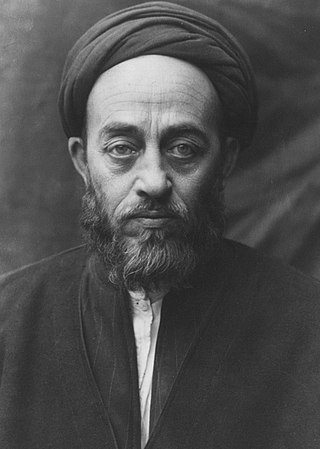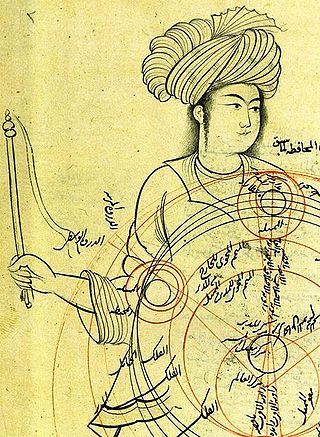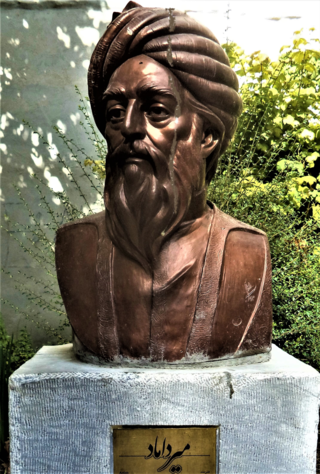Related Research Articles
Shirazi, an adjective meaning "from Shiraz" a city in Iran (Persia), may refer to:

Muhammad Baqir al-Sadr, also known as al-Shahīd al-Khāmis, was an Iraqi philosopher, and the ideological founder of the Islamic Dawa Party, born in al-Kadhimiya, Iraq. He was father-in-law to Muqtada al-Sadr, a cousin of Muhammad Sadeq al-Sadr and Imam Musa as-Sadr. His father Haydar al-Sadr was a well-respected high-ranking Shi'a cleric. His lineage can be traced back to Muhammad through the seventh Shia Imam Musa al-Kazim. Muhammad Baqir al-Sadr was executed in 1980 by the regime of Saddam Hussein along with his sister, Amina Sadr bint al-Huda.

"Shihāb ad-Dīn" Yahya ibn Habash Suhrawardī (1154–1191) was a philosopher and founder of the Iranian school of Illuminationism, an important school in Islamic philosophy. The "light" in his "Philosophy of Illumination" is the source of knowledge. He is referred to by the honorific title Shaikh al-ʿIshraq "Master of Illumination" and Shaikh al-Maqtul "the Murdered Master", in reference to his execution for heresy. Mulla Sadra, the Persian sage of the Safavid era described Suhrawardi as the "Reviver of the Traces of the Pahlavi (Iranian) Sages", and Suhrawardi, in his magnum opus "The Philosophy of Illumination", thought of himself as a reviver or resuscitator of the ancient tradition of Persian wisdom. Suhrawardi provided a new Platonic critique of the peripatetic school of Avicenna that was dominant at his times, and that critique involved the fields of Logic, Physics, Epistemology, Psychology, and Metaphysics.

Muhammad Husayn Tabataba'i was an Iranian scholar, theorist, philosopher and one of the most prominent thinkers of modern Shia Islam. He is perhaps best known for his Tafsir al-Mizan, a twenty-seven-volume work of tafsir, which he produced between 1954 and 1972. He is commonly known as Allameh Tabataba'i and the Allameh Tabataba'i University in Tehran is named after him.

Ṣadr ad-Dīn Muḥammad Shīrāzī, more commonly known as Mullā Ṣadrā, was a Persian Twelver Shi'i Islamic mystic, philosopher, theologian, and ‘Ālim who led the Iranian cultural renaissance in the 17th century. According to Oliver Leaman, Mulla Sadra is arguably the single most important and influential philosopher in the Muslim world in the last four hundred years.
Jamāl ad-Dīn al-Ḥasan bin Yūsuf bin ʿAli bin al-Muṭahhar al-Ḥillī, commonly known as Allāma Ḥelli, was a Twelver Shia theologian and mujtahid. He was one of the well known Shia scholars of his time. His full name is Jamāl ad-Dīn Abu Manṣūr al-Ḥasan bin Yūsuf ibn al-Muṭahhar al-Ḥillī. We know of at least one hundred books written by him, some of which are still in the form of manuscripts. Muhammad bin Al-Hassan al Hurr Al- Amili in his work Amal al Amil, p. 40, enumerated no less than 67 works of this learned author.

Qotb al-Din Mahmoud b. Zia al-Din Mas'ud b. Mosleh Shirazi (1236–1311) was a 13th-century Persian polymath and poet who made contributions to astronomy, mathematics, medicine, physics, music theory, philosophy and Sufism.

Mir Damad, known also as Mir Mohammad Baqer Esterabadi, or Asterabadi, was a Twelver Shia Iranian philosopher in the Neoplatonizing Islamic Peripatetic traditions of Avicenna. He also was a Suhrawardi, a scholar of the traditional Islamic sciences, and foremost figure of the cultural renaissance of Iran undertaken under the Safavid dynasty. He was also the central founder of the School of Isfahan, noted by his students and admirers as the Third Teacher after Aristotle and al-Farabi.

The Isfahan School is a school of Islamic philosophy. It was founded by Mir Damad and reached its fullest development in the work of Mulla Sadra. The name was coined by Seyyed Hossein Nasr and Henry Corbin.
Iranian philosophy or Persian philosophy can be traced back as far as to Old Iranian philosophical traditions and thoughts which originated in ancient Indo-Iranian roots and were considerably influenced by Zarathustra's teachings. According to the Oxford Dictionary of Philosophy, the chronology of the subject and science of philosophy starts with the Indo-Iranians, dating this event to 1500 BC. The Oxford dictionary also states, "Zarathustra's philosophy entered to influence Western tradition through Judaism, and therefore on Middle Platonism."

Jalal al-Din Davani, also known as Allama Davani, was a theologian, philosopher, jurist, and poet, who is considered to have been one of the leading scholars in late 15th-century Iran.
Uyoun Akhbar Al-Ridha, counted as a Hadith book among Shia, the book was written by Ibn Babawayh, one of the great scholars of Shia Muslims. The book concerned with saying and life of the eighth Shia Imam Ali al-Ridha.
Kasr al-asnam al-jahiliyyah fi dhamm al-mutasawwifin. The word "mutasawwifin" referred to here is not used according to its usual meaning of one who follows Sufism but means one who pretends to follow it. In this treatise, Mulla Sadra criticizes the excesses of those in his day who, pretending to be Sufis, disregarded the Shari'ah and its teachings.
Sharh al-Isharat is a philosophical commentary on Avicenna's book Al-isharat wa al-tanbihat. This commentary has been written by Nasir al-Din al-Tusi in defense of the philosophy of Avicenna in response to the criticism made against him by Fakhr al-Din al-Razi in a book of the same title.
Tafasir Al Quran are collections of books as commentaries on the Quran, written by Mulla Sadra.

Ghiyāth al-Din Mansur Dashtaki (1461-1542) was an Iranian Safavid Islamic philosopher, the son of Sadr ad-Din Dashtaki. He has been called "the foremost philosopher of sixteenth-century Islam".
Sadr al-Shari'a al-Asghar, also known as Sadr al-Shari'a al-Thani, was a Hanafi-Maturidi scholar, faqih (jurist), mutakallim (theologian), mufassir, muhaddith, nahawi (grammarian), lughawi (linguist), logician, and astronomer, known for both his theories of time and place and his commentary on Islamic jurisprudence, indicating the depth of his knowledge in various Islamic disciplines.
References
- 1 2 ( Nasr 2006 , p. 195)
- ↑ "QĀŻI SAʿID QOMI". iranicaonline.org.
Works cited
- Nasr, Seyyed Hossein (2006). Islamic Philosophy from Its Origin to the Present. SUNY Press. ISBN 978-0-7914-6799-2.